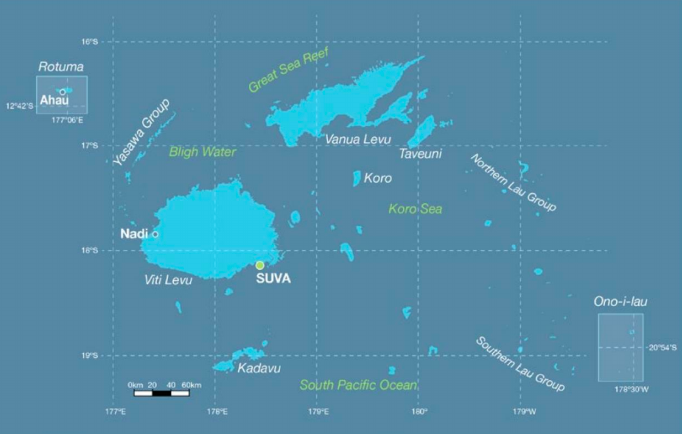Fiji is located in the Pacific Ocean’s tropical cyclone belt. The island nation experiences frequent cyclones (on average, one cyclone per year) and with them damaging winds, rain and storm surges. Besides cyclones, the country suffers from other extreme events associated with climate change such as extreme rainfall, flooding, droughts and temperature extremes as well as sea-level rise.
Being mountainous in its interior, cities and towns are mainly located on the coast and along rivers. The result is that Fiji’s towns and cities are particularly exposed to seaborne and riverine natural hazards, cyclones, storm surges, coastal and riverine erosion, landslides, floods and already occurring sea level rise due to climate change. Mangrove deforestation and coral reef extraction in order to accommodate urban development and for reasons of income generation are increasing the vulnerability of urban areas to coastal hazards, as both mangrove forests and coral reefs provide effective barriers against storm surges and cyclones. Of particularly critical concern are the residents of informal settlements in towns and cities as many such settlements are located in highly vulnerable areas, such as riverbanks and pockets of coastal land.
The project will focus on informal settlements across four urban areas and towns in Fiji: Lautoka, Sigatoka, Nadi and Lami, which are located in the Greater Suva Urban Area.
The overall objective of the project is to increase the resilience of informal urban settlements in Fiji that are highly vulnerable to climate change and disaster risks. This will be achieved by:
- Institutional strengthening for enhanced local climate response: Reduce vulnerability at the city-level to climate-related hazards and threats with a particular view to community level resilience
- Local (community/informal settlement) resilience strengthening: Strengthen awareness and ownership of adaptation and climate risk
reduction processes and capacity - Enhancing resilience of community level physical, natural and socio-economic assets and ecosystems: Increase adaptive capacity with relevant development and natural resource sectors; Increase ecosystem resilience in response to climate change and variability-induced stress
- Awareness raising, knowledge management and Communication: Project implementation is fully transparent. All stakeholders are informed of products and results and have access to these for replication.
| Component 1. Institutional strengthening to enhance local climate response actions | US$ 295,143 |
| Component 2. Local (community/informal settlements) resilience strengthening | US$ 480,000 |
| Component 3. Enhancing resilience of community level physical, natural and social assets and ecosystems | US$ 2,610,000 |
| Component 4. Awareness raising, knowledge management and communication | US$ 150,000 |
| Project execution cost | US$ 369,000 |
| Total project cost | US$ 3,904,143 |
| Implementing Entity Project Cycle Management Fee | US$ 331,852 |
| Grant Amount | US$ 4,235,995 |
Project Documents
| Attachment | Type | Size |
|---|---|---|
| Project document | 2 KB | |
| Mid-term evaluation report | 3 MB | |
| PPR1 (for web) | XLSX | 204 KB |
| PPR2 (for web) | XLSX | 208 KB |
| PPR3 (for web) | XLSX | 250 KB |



